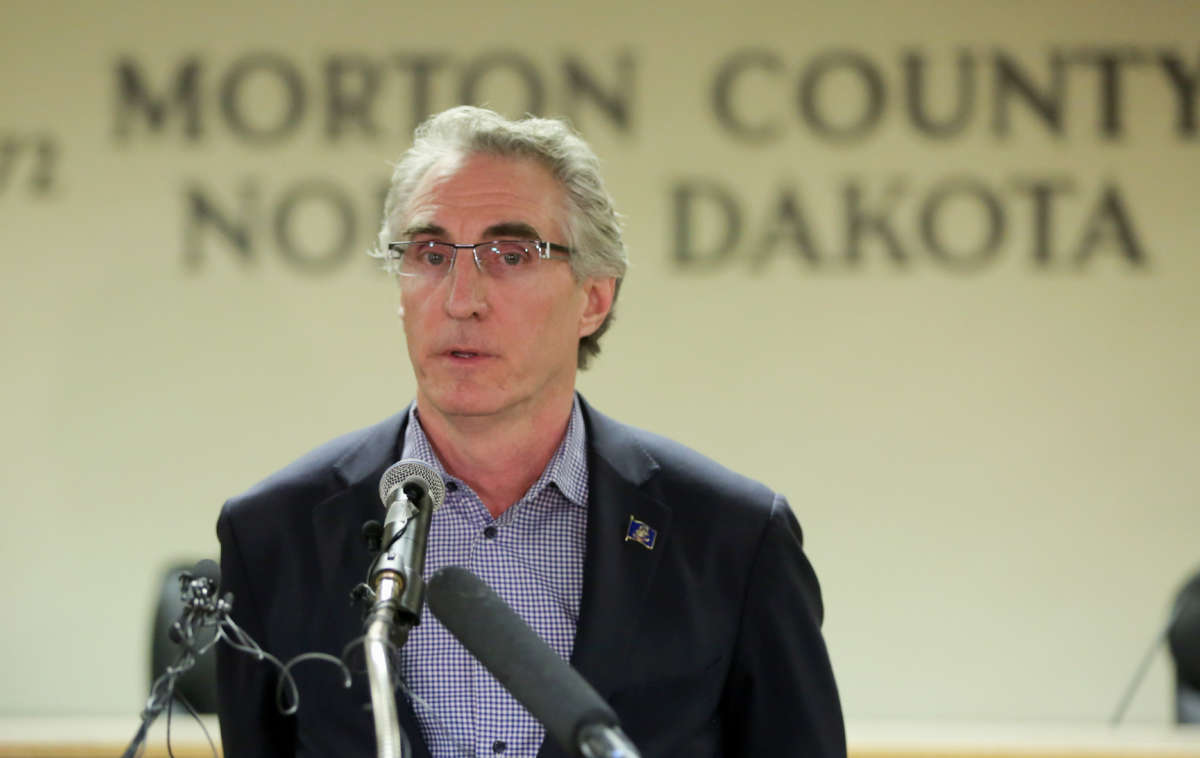Truthout is an indispensable resource for activists, movement leaders and workers everywhere. Please make this work possible with a quick donation.
Two Indigenous nations in North Dakota are suing the state, alleging that Republican lawmakers redrew district maps in ways that dilute their voices and violate the Voting Rights Act.
New maps were redrawn and approved by the state legislature, which is controlled by Republicans, in November. GOP Gov. Doug Burgum signed the maps into law shortly afterward.
In their lawsuit, Turtle Mountain Band of Chippewa Indians and the Spirit Lake Tribe say that the state was supposed to redraw maps, after the decennial Census, to allow Indigenous voters to select candidates of their choice to the state House of Representatives. Instead, actions taken by state lawmakers will divide their districts or move their voters into different ones, allowing white voters to have an even larger influence in state politics.
In North Dakota, voters in each state House district select two individuals to represent them in Bismarck. Under new rules concocted last fall, however, some districts are being divided into two subdistricts, where voters in each section will get to pick one of the two members separately.
Michael Carter, a staff attorney with the Native American Rights Fund, alleges the two subdistricts that were created in District 9, where members of the Turtle Mountain Band reside, packs Indigenous voters into one of the subdistricts but spreads many other Indigenous voters among other districts, thereby diluting their voices in the state House. Instead of having influence over the selection of the two House members for District 9, the subdistricting makes it so that they’ll likely only have influence over the selection of one member, while the other House member for District 9 will likely be picked by a majority-white population.
The maps pack “the entire reservation into a single subdistrict, rather than providing the tribal members in that area the opportunity to elect two state House representatives,” Carter said.
Spirit Lake voters are also being moved into District 15, again diluting their voices into a majority-white area.
“North Dakota created a map that guarantees voters living on these two tribal reservations face a no-win scenario before each election even begins,” said Zachary King, one of the plaintiffs in the lawsuit filed by the Turtle Mountain Band of Chippewa.
“With each election, you hope your vote makes a positive change. Yet our state officials chose to create and approve an election map that robs Native American voters of that opportunity,” added plaintiff Collette Brown from Spirit Lake Tribe.
Voters from both Indigenous nations tend to vote for Democratic candidates more than Republican ones. The majority-white areas surrounding them are more conservative, and tend to pick Republicans.
According to the lawsuit, the new districts violate Section 2 of the Voting Rights Act, which disallows “voting practices or procedures” that discriminate on the basis of race.
“Our voice is going to be muffled once again. It’s getting a little sickening, tell you the truth,” said Turtle Mountain Band of Chippewa chairman Jamie Azure, speaking to The Guardian about the matter.
A terrifying moment. We appeal for your support.
In the last weeks, we have witnessed an authoritarian assault on communities in Minnesota and across the nation.
The need for truthful, grassroots reporting is urgent at this cataclysmic historical moment. Yet, Trump-aligned billionaires and other allies have taken over many legacy media outlets — the culmination of a decades-long campaign to place control of the narrative into the hands of the political right.
We refuse to let Trump’s blatant propaganda machine go unchecked. Untethered to corporate ownership or advertisers, Truthout remains fearless in our reporting and our determination to use journalism as a tool for justice.
But we need your help just to fund our basic expenses. Over 80 percent of Truthout’s funding comes from small individual donations from our community of readers, and over a third of our total budget is supported by recurring monthly donors.
Truthout’s fundraiser ended last night, and we fell just short of our goal. But your support still matters immensely. Whether you can make a small monthly donation or a larger one-time gift, Truthout only works with your help.
